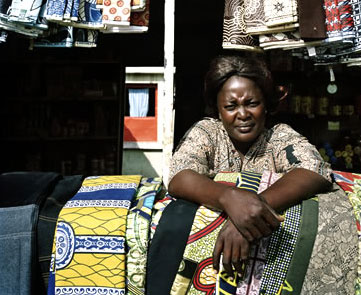According to the World Bank, Zambia accounts for one of the highest proportion of female entrepreneurs on the African Continent. The Financial Scope Report of 2015 further states that there is still a huge financing gap where 67% of Zambian women are financially excluded compared to 57% of men.

Sex Disaggregated data is key in bridging the financial inclusion gender gap. Women are a driving force in the African economy but their access to finance is still far too small. World Bank group research has established that women are more likely than men to contribute additional income to household poverty reduction which means that giving women more access to credit and increasing their economic power will translate into improved economic development. Furthermore, the world economic forum in 2018 carried out a study in which their findings included evidence that increasing women’s access to and use of financial services can have both economic and societal benefits.
For example, in Kenya, women merchants who opened a basic bank account invested more in their businesses, Female-headed households in Nepal spent more on education after opening a savings account.
According to the International Trade Centre (ITC) surveys, 10 million small and medium scale enterprises owned by women account for 80 percent of jobs created by SME’s around the globe. ITC data further indicates that exporting firms owned by women earn more, employ more people and pay higher wages this attests to the Zambian proverb that “when you educate and provide for a woman you educate the nation”.

In Zambia, it is evident through several banks initiatives including the central bank that there has been a common goal to create a deeper connection between the banking sector and female entrepreneurs and this is all in order to develop solutions for driving the financial inclusion agenda. In 2019, Bank of Zambia (BOZ) marked a major step in advancing women’s financial inclusion after unveiling the results of a landmark survey that found women in Zambia face more challenges in accessing formal financial products and services as compared to their male counterparts.

The then Deputy Governor Dr. Tukiya Kankasa –Mabula, said the BOZ had used gender-specific data to identify key barriers facing women in accessing financial services. This, she said, made the central bank better understand the “magnitude of the financial inclusion gender gap” and “develop policies that specifically target women’s financial inclusion’’.
Research conducted by the African Development Bank, Alliance for Financial inclusion, Women’s World Banking and The World Bank is shedding more light on the extent of women’s and youth’s exclusion and the efforts to empower them and close the gaps. Several studies have been carried out in the last couple of years to clearly determine the deficiencies and ways in which the financial inclusion gap can be reduced as well as benefits that the economy will derive from such initiatives.
The African Center for Economic Transformation (ACET) , an Accra-based economic policy institute, undertook a study in 2017 to assess the effectiveness of financial sector initiatives in advancing women’s and/or youth financial inclusion in Guinea, Sierra Leone and Zambia. Supported by a grant from the Canadian International Development Research Centre (IDRC), the study evaluated the state of financial inclusion in order to draw lessons from policymakers, regulators and service providers with a view to increasing entrepreneurship opportunities for women and youth. One of their findings in regard to Zambia is that Women-owned small businesses had the lowest proportion of non-performing loans, ranging between 1% and 3% during the period 2014 – 2018. This is on average 17 percentage points lower than the proportion among men, showing that women and women-owned businesses are more prudent borrowers than their men counterparts. Disaggregated data of this nature helps build the business case for developing specific products and services for women and youth.
The Bank of Zambia has taken up financial inclusion, especially gender-based, as an important part of their National Financial Inclusion Strategy.
Bank of Zambia carried out research in 2018 in order to address sex-disaggregated financial inclusion to determine the levels of access, usage, and quality of financial services in order to assist in identifying the existing policies, strategies, and regulatory measures. The data obtained covered 64 institutions regulated by BOZ. It was observed that most financial institutions had no or limited differentiation in gender-focused products. It was also observed that men have a higher loan repayment default as compared to women.
Several Banks thus far have come up with initiatives to help encourage women banking, access to funds, and entrepreneurship.
One such initiative is the Womenpreneur Pitch-a-ton Africa 2020 which is going to be the largest business growth program for women in Africa. It is a five-month drive designed to provide financial and business Skills to female entrepreneurs in Africa.
The International Finance Corporation (IFC), which is a private sector arm of the World Bank Group, has its main focus on increasing economic development in developing countries through private sector development. IFC works through financial institutions to provide much-needed access to finance for millions of individuals and micro, small and medium enterprises. This is part of the World Bank Group’s strategy to end extreme poverty and build shared prosperity.
IFC partners with Access Bank Zambia which is a subsidiary of the Access Bank Group. This initiative is tailor-designed for women who run and own their innovative businesses and need the grant to expand their business as well as expert training to help grow their business. This is available for women aged 18 – 40 years who have been running a business for at least a year and have a registered company. This initiative offers a mini MBA provided by the IFC which encompasses world-class training as well as mentoring opportunities which means that not only will they be assisted with funds to help grow their business, they will be empowered through education which increases women entrepreneurs’ success rates and contributes to economic development. This initiative was first launched by Access Bank Nigeria in 2019 and now it is being extended to 6 other African countries where Access Bank has its presence. These countries are Ghana, Rwanda, Zambia, Sierra – Leone, Gambia, and Congo.
Access Bank recognizes the importance of SMEs to economic stability and goes the extra mile to ensure that SME’s are adequately financed even so now that we are going through a global pandemic. The Bank’s contributions towards SME banking led to Access Bank being announced as Africa’s Best Bank for SMEs Winner, Euromoney Awards for excellence 2020.

The banking industry is front line on the empowerment of women and even with regards to employment, Zambia has seen a large majority of women working in the banking industry and holding high positions. This is a step towards a very bright future as Zambian women and economic development.



